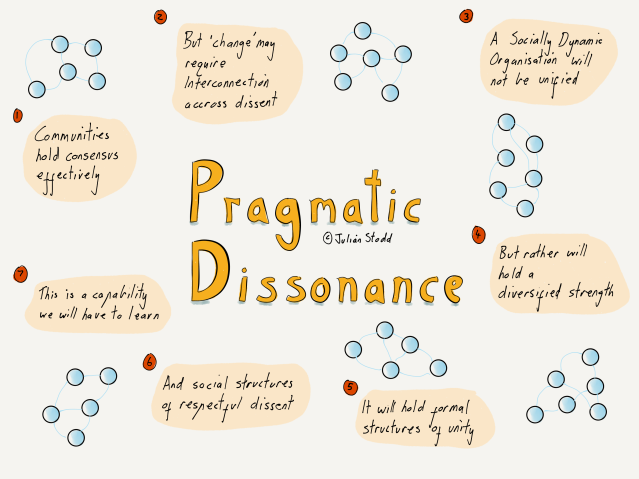We come together in communities, but are driven apart by our differences: in a systemic view of change, we may need to create the conditions for, and opportunity to, both agree, and dissent. It is unlikely that we will achieve transformation through unity alone, because unity triggers opposition: instead, we may need a broad space, a space for our pragmatic dissonance to thrive.
In my broader work on the nature, and structure, of the Social Age, it’s increasingly clear that we are tribal creatures at hear: we gather together in formal structures, hierarchy and system, but we exist in social ones (tribes, and networks of pride, and trust). ‘Purpose’ may be framed by a system, or our formal leaders, but it’s delivered through individual agency, and collective effort and assent.
Our approach to Organisational change should reflect this reality: instead of driving change through formal programmes, architectural narratives that we drive through an Organisation, accompanied by structural change in the hard (and visible) system, we should, instead, simply seek to frame the change, and create the space for communities to support it. Not only communities of consensus, but communities of difference and dissent.
Change requires us to work with idiots, but the idiots may be us.
This is a fundamental truth of difference: we all tend to be ‘right’, according to our local definition of ‘right’.
If you ask how much i weigh, it’s an unarguable scientific fact, but if you ask how i feel, it’s a subjective judgement. And if you ask how beautiful i am, it’s a subjective judgement that you can externally validate. We may each have our reasons for our answers, but there is no common scale of consensus.
Within the National Health Service (NHS), i’ve been carrying out various pieces of research into ‘community’, asking people about the communities that they are in, the purpose that they serve, and what makes those communities effective. Over the last couple of weeks. I’ve asked about the ‘most important thing that your most important community gives you’, and the results are telling. ‘Belonging’, ‘Support’, and ‘Purpose’ rate as the top three. These are words of unity. In the last four groups i’ve surveyed, not one single person listed words of challenge, or difference.
It’s what we should respect and value: we come together to belong (socially), and we come together to be effective (organisationally).
‘Organisations’ are structures that hold unity, even through dissent. ‘Communities’ are structures that hold unity often precisely because of that dissent. We come together in opposition possibly more readily that we do in consensus.
Moving towards a more Socially Dynamic Organisation will take us beyond aspiration, and into the reality of the radically complex forces that govern interpersonal relationships, and modes of social organisation. That’s no bad thing: Organisations are fake, and people are real. A Socially Dynamic Organisation, deeply fair, founded upon individual agency, and respectful differences, will recognise that. It will find strength precisely through that difference.




Pingback: Guide to the Social Age 2019: Trust | Julian Stodd's Learning Blog
Pingback: Guide to the Social Age 2019: Interconnectivity | Julian Stodd's Learning Blog
Pingback: Guide to the Social Age 2019: Power | Julian Stodd's Learning Blog
Pingback: The Future of Work: Belief and Currency | Julian Stodd's Learning Blog
Pingback: Community Firmament | Julian Stodd's Learning Blog
Pingback: Storytelling Experiment: Day 3 – Aggregation | Julian Stodd's Learning Blog
Pingback: Finding Your Campfire: Being Together Apart | Julian Stodd's Learning Blog
Pingback: This Book is Imperfect: The Socially Dynamic Organisation | Julian Stodd's Learning Blog
Pingback: #WorkingOutLoud on a Social Learning Design Workshop | Julian Stodd's Learning Blog